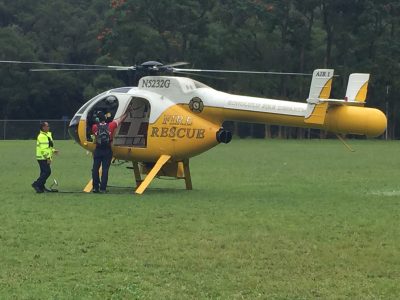HONOLULU (KHON2) — Hiking can be a daunting experience that comes with a lot of risks and plenty of rewards. If something goes wrong on the hike, however, it can be tempting to call emergency services for aid.
While it is important to get help in times of genuine concern or crisis, Kauaʻi Fire Department Chief Michael Gibson wants to remind the public that not every intimidating scenario warrants a rescue.
What risks come with a rescue?
“All rescues carry inherent risks, not only for the person being rescued but also for firefighters, the pilot and others in the area,” Gibson said. “Every deployment of Air 1 involves hazardous flying conditions, especially in remote or rugged terrain, and those risks should only be taken when absolutely necessary.”
Rescuers aren’t guaranteed safety simply because they are professionals. In addition, unnecessary rescues divert resources away from important concerns in the community, such as active fires or a hiker in need of genuine help.
“Calling 911 for non-emergencies ties up limited resources and places crews in unnecessary danger,” Gibson said.
When should you call 911?
For KFD, “genuine emergencies” include serious injuries or medical episodes that could lead to bigger issues.
“Rescues should be requested only in genuine emergencies, such as when someone is seriously injured, experiencing a medical crisis or physically unable to make it out on their own,” Gibson said.
Using your best judgement is key in emergency scenarios, which can prevent the unnecessary diversion of resources and endangering first responders.
When should you not call 911?
Hiking comes with several risks and unpleasant factors which are sure to affect anyone regardless of hiking experience or physical level. Being tired is one of these side effects, but that does not constitute an emergency call.
“Hikers should not call 911 simply because they are tired. Fatigue is a normal part of hiking challenging trails like Kalalau and does not warrant a helicopter evacuation,” Gibson said. “Air 1 is a critical resource that must remain available for true emergencies such as wildfires and life-threatening medical situations.”
In addition to fatigue, fear or discomfort is also not a reason to contact authorities.
“One common concern from hikers is that they are too scared to cross a difficult section, such as the narrow ledge along the Kalalau Trail. In many cases, these same hikers successfully crossed that section on their way in but hesitate on the return,” Gibson said. “While it is natural to feel apprehension, fear alone is not a valid reason to request an evacuation.”
To avoid any potential emergencies, Gibson urges that hikers plan ahead, know their limits and avoid unnecessarily strenuous hikes. When in doubt, the best thing to do is to rest, pace yourself or turn back before escalating your situation.
